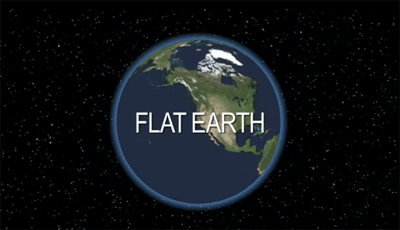
Image: Earth from Space, Apollo 17, 1972
After hearing rumors concerning the existence of secret NASA photographs of the Earth as seen from outer space, the writer and future digital-utopianist Stewart Brand fought to have these images released to the public. The hope behind Brand's 1966 campaign was that these "blue marble" photographs of the whole Earth would for the first time tangibly allow the planet to appear small, conceptually graspable and very much alone in the wilderness of space. Forty years later, the London-based new media artists, Thomson & Craighead, created the video Flat Earth (2007), a visualization of Earth that refers to a different perceptual moment.

Image: Thomson & Craighead, Flat Earth, 2007
Commissioned for Animate Projects in 2007, their project is not an unveiling of the spheric, "blue marble" image of the Earth as viewed from outer space but, rather, an attempt to describe the "flat" Earth as viewed from the membrane of the Internet. Blog entries and flickr photos interact with freely available satellite imagery to give a re-shaped conception of what space and distances between people effectively means in a networked world. The video begins in the tract housing of the American suburbs where we hear a performance of an actual blog entry from the angsty, young dancer, "teenangel." A few seconds later, we zoom into the sky above San Francisco as the bemused "patriot2000" informs us that he just read a translation of one of his blog posts into German and he's now curious to learn German. We travel across the globe to Zimbabwe, Iran, and Europe. It's a great seven minutes and it gets at something amazing about the Internet: if, according to Walter Benjamin, the technologies at the beginning of the 20th century allowed for perceptual reproduction to "keep pace with speech," then the technologies of the 21st century allows for perceptual reproduction to keep pace with thought. As a reflective, older blogger muses in the videos last words, "if all else can be doubted, if our senses lie, at least I can start from the indisputable first principle that I am a thing that thinks." - Gene McHugh